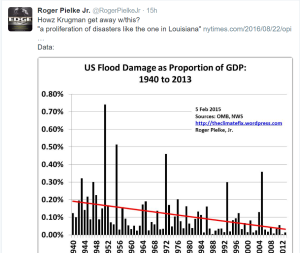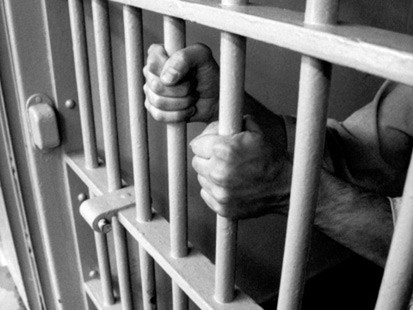Via: http://www.wsj.com/articles/my-unhappy-life-as-a-climate-heretic-1480723518
Excerpts: Much to my surprise, I showed up in the WikiLeaks releases before the election. In a 2014 email, a staffer at the Center for American Progress, founded by John Podesta in 2003, took credit for a campaign to have me eliminated as a writer for Nate Silver ’s FiveThirtyEight website. In the email, the editor of the think tank’s climate blog bragged to one of its billionaire donors, Tom Steyer : “I think it’s fair [to] say that, without Climate Progress, Pielke would still be writing on climate change for 538.”
WikiLeaks provides a window into a world I’ve seen up close for decades: the debate over what to do about climate change, and the role of science in that argument. Although it is too soon to tell how the Trump administration will engage the scientific community, my long experience shows what can happen when politicians and media turn against inconvenient research—which we’ve seen under Republican and Democratic presidents.
I understand why Mr. Podesta—most recently Hillary Clinton ’s campaign chairman—wanted to drive me out of the climate-change discussion. When substantively countering an academic’s research proves difficult, other techniques are needed to banish it. That is how politics sometimes works, and professors need to understand this if we want to participate in that arena.
More troubling is the degree to which journalists and other academics joined the campaign against me. What sort of responsibility do scientists and the media have to defend the ability to share research, on any subject, that might be inconvenient to political interests—even our own?
I believe climate change is real and that human emissions of greenhouse gases risk justifying action, including a carbon tax. But my research led me to a conclusion that many climate campaigners find unacceptable: There is scant evidence to indicate that hurricanes, floods, tornadoes or drought have become more frequent or intense in the U.S. or globally. In fact we are in an era of good fortune when it comes to extreme weather. This is a topic I’ve studied and published on as much as anyone over two decades. My conclusion might be wrong, but I think I’ve earned the right to share this research without risk to my career.
Instead, my research was under constant attack for years by activists, journalists and politicians. In 2011 writers in the journal Foreign Policy signaled that some accused me of being a “climate-change denier.” I earned the title, the authors explained, by “questioning certain graphs presented in IPCC reports.” That an academic who raised questions about the Intergovernmental Panel on Climate Change in an area of his expertise was tarred as a denier reveals the groupthink at work.
Yet I was right to question the IPCC’s 2007 report, which included a graph purporting to show that disaster costs were rising due to global temperature increases. The graph was later revealed to have been based on invented and inaccurate information, as I documented in my book “The Climate Fix.” The insurance industry scientist Robert-Muir Wood of Risk Management Solutions had smuggled the graph into the IPCC report. He explained in a public debate with me in London in 2010 that he had included the graph and misreferenced it because he expected future research to show a relationship between increasing disaster costs and rising temperatures.
When his research was eventually published in 2008, well after the IPCC report, it concluded the opposite: “We find insufficient evidence to claim a statistical relationship between global temperature increase and normalized catastrophe losses.” Whoops.
The IPCC never acknowledged the snafu, but subsequent reports got the science right: There is not a strong basis for connecting weather disasters with human-caused climate change.
Yes, storms and other extremes still occur, with devastating human consequences, but history shows they could be far worse. No Category 3, 4 or 5 hurricane has made landfall in the U.S. since Hurricane Wilma in 2005, by far the longest such period on record. This means that cumulative economic damage from hurricanes over the past decade is some $70 billion less than the long-term average would lead us to expect, based on my research with colleagues. This is good news, and it should be OK to say so. Yet in today’s hyper-partisan climate debate, every instance of extreme weather becomes a political talking point.
For a time I called out politicians and reporters who went beyond what science can support, but some journalists won’t hear of this. In 2011 and 2012, I pointed out on my blog and social media that the lead climate reporter at the New York Times , Justin Gillis, had mischaracterized the relationship of climate change and food shortages, and the relationship of climate change and disasters. His reporting wasn’t consistent with most expert views, or the evidence. In response he promptly blocked me from his Twitter feed. Other reporters did the same.
…
I suppose it is a distinction of a sort to be singled out in this manner by the president’s science adviser. Yet Mr. Holdren’s screed reads more like a dashed-off blog post from the nutty wings of the online climate debate, chock-full of errors and misstatements.
But when the White House puts a target on your back on its website, people notice. Almost a year later Mr. Holdren’s missive was the basis for an investigation of me by Arizona Rep. Raul Grijalva, the ranking Democrat on the House Natural Resources Committee. Rep. Grijalva explained in a letter to my university’s president that I was being investigated because Mr. Holdren had “highlighted what he believes were serious misstatements by Prof. Pielke of the scientific consensus on climate change.” He made the letter public.
The “investigation” turned out to be a farce. In the letter, Rep. Grijalva suggested that I—and six other academics with apparently heretical views—might be on the payroll of Exxon Mobil (or perhaps the Illuminati, I forget). He asked for records detailing my research funding, emails and so on. After some well-deserved criticism from the American Meteorological Society and the American Geophysical Union, Rep. Grijalva deleted the letter from his website. The University of Colorado complied with Rep. Grijalva’s request and responded that I have never received funding from fossil-fuel companies. My heretical views can be traced to research support from the U.S. government.
But the damage to my reputation had been done, and perhaps that was the point. Studying and engaging on climate change had become decidedly less fun. So I started researching and teaching other topics and have found the change in direction refreshing. Don’t worry about me: I have tenure and supportive campus leaders and regents. No one is trying to get me fired for my new scholarly pursuits.
But the lesson is that a lone academic is no match for billionaires, well-funded advocacy groups, the media, Congress and the White House. If academics—in any subject—are to play a meaningful role in public debate, the country will have to do a better job supporting good-faith researchers, even when their results are unwelcome. This goes for Republicans and Democrats alike, and to the administration of President-elect Trump.
Academics and the media in particular should support viewpoint diversity instead of serving as the handmaidens of political expediency by trying to exclude voices or damage reputations and careers. If academics and the media won’t support open debate, who will?
Mr. Pielke is a professor and director of the Sports Governance Center at the University of Colorado, Boulder. His most recent book is “The Edge: The Wars Against Cheating and Corruption in the Cutthroat World of Elite Sports” (Roaring Forties Press, 2016).
#
Related Links:
Harassment prompts scientist to stop his research debunking extreme weather claims – CU Climate Expert Dr. Roger Pielke Jr.: I am Under ‘Investigation’ – Accuses Dems of ‘a politically-motivated ‘witch hunt’ designed to intimidate me (and others) and to smear my name’ Dr. Pielke Jr.:’ Congressman Grijalva doesn’t have any evidence of any wrongdoing on my part, either ethical or legal, because there is none. He simply disagrees with the substance of my testimony – which is based on peer-reviewed research funded by the US taxpayer, and which also happens to be the consensus of the IPCC (despite Holdren’s incorrect views)’ ‘The incessant attacks and smears are effective, no doubt, I have already shifted all of my academic work away from climate issues. I am simply not initiating any new research or papers on the topic and I have ring-fenced my slowly diminishing blogging on the subject.’
Pielke Jr. on how extreme weather is NOT getting worse:
‘Flood disasters are sharply down. U.S. floods not increasing either.’
‘Is U.S. drought getting worse? No.’
‘U.S. hurricane landfalls (& their strength) down by ~20% since 1900.’
‘Recent years have seen record low tornadoes.’
Extreme weather expert Dr. Roger Pielke Jr. slams ‘Michael Mann and the climate wackos’ for being ‘obsessed’ with attacking research that challenges their climate claims – Dr. Roger Pielke Jr.: ‘What’s the deal with Michael Mann and the climate wackos still complaining about a Five Thirty Eight piece I did almost two years ago? Obsessed?’
Dr. Roger Pielke Jr. on climate ‘Witch Hunt’: ‘My 11-year old asked me if I was going to jail’
Pielke Jr.: ‘Yesterday, my 11-year old asked me if I was going to jail. Really nasty stuff.’
‘My older kids in High School had teachers pull them aside to ask about their father’s ‘investigation’. Smear campaigns are about collateral damage.’ – Several reporters have asked me: ‘Why present research results liked by Republicans?’
‘Eric Holthaus – a widely read scientist and climate activist – taunted me with the following bizarre Tweet: “It’s getting harder and harder for @RogerPielkeJr to remain relevant.” Upon later learning that I’m no longer doing climate change research Holthaus Tweeted that his earlier taunt was no longer relevant. Great evidence that a lot of this is about eliminating unwelcomed voices in the debate.’





